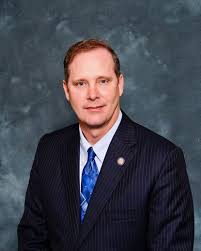By Chris Sprowls and Wilton Simpson
Throughout our history, Floridians have reveled in our state’s natural resources. With our miles of beautiful beaches, gorgeous coastline, and ample sunshine, it is no wonder our state is home to over 21 million and a destination for people from across the globe.
As we celebrate the many reasons Florida is the best place to live, work, start a business, raise a family, and retire, there is also a great paradox associated with being a Floridian: Our state’s greatest asset is also a significant liability.
With 1,350 miles of coastline, relatively low elevations, and communities built on top of former swampland, Florida remains particularly vulnerable to the risk of flooding caused by sea-level rise. Over the last several years, we have seen that risk grow exponentially.

In addition to the immense damage caused by storm surge, coastal communities are experiencing high-tide flooding, sometimes referred to as “sunny day” or “nuisance” flooding, with increasing frequency. The area at risk from one foot of projected sea-level rise contains more than 65,000 homes and 121,909 Floridians.
Over 20 percent of homes have a greater than one-in-four chance of flooding over a 30-year mortgage. Unless we take steps to curb this risk, those numbers will likely grow.
Most of us are all-too-familiar with the worrying videos and images that portray the safety and public health issues associated with flooding. While less immediate, threats to our economy caused by high-tide flooding and devastating storm surge are also troubling. Rising water damages homes, disrupts businesses, and displaces families and employees, which leads to, among other significant impacts, increases in insurance premiums for all Floridians.

Over the last 20 years, the Republican-led Legislature has taken significant steps to keep our state affordable by consistently reducing the tax burden on families and businesses. Despite this good work, whether you live on the coast or in the heartland, the rising cost of insurance will make Florida less affordable.
What exactly can our state government do? Quite a bit.
Unlike the overpriced and entirely unrealistic “Green New Deal,” Florida remains focused on finding solutions that actually work. Through grant funding appropriated by the Legislature, Florida’s Resilient Coastlines Program recently announced grant awards that will strengthen resilience initiatives for 30 coastal communities in 17 counties. Over the next two years, we will continue to develop cost effective strategies that will ensure Florida responsibly mitigates projected impacts of sea-level rise, balancing the costs with future benefits.
First, we want to elevate flood mitigation as a critical part of Florida’s public safety infrastructure. Flood mitigation can take many forms from enhancing natural barriers like our beaches, dune systems, mangroves, oyster beds, and stormwater parks, to erecting man-made barriers like seawalls, berms, and water catchment areas, to improving our stormwater systems.
Just as we do with our State Transportation Work Plan, we should approach these projects systematically by assessing long-term needs, making sound engineering decisions, and being fiscally disciplined.
Second, we plan to further engage the federal government as a partner in Florida’s long-term planning process. The U.S. Army Corps of Engineers is conducting a coastal storm risk management study for Miami-Dade County to develop a project for large-scale flood risk reduction.
The Federal Emergency Management Agency and the U.S. Department of Housing and Urban Development have recently made significant funding available for resilience in the context of rebuilding areas damaged by hurricanes. These are great first steps toward an enhanced federal-state partnership; however, given the size and importance of our state, Florida should be receiving a greater proportion of funds allocated for flood prevention.
Third, we want to recognize and address the disparate local impacts of this challenge. Tampa Bay, for instance, is one of the areas at greatest risk for storm surge. Not only in the state, but in the nation.
We want to partner with cities and counties that are doing good work and incentivize those who are falling behind. While state government must take a leading role in this fight, we are not going to simply subsidize high-risk communities. In this area, as in many other policy areas, we believe in helping those who are ready and willing to help themselves.
Although the COVID-19 pandemic can feel overwhelming and all-consuming, we cannot allow short-term anxieties to blind us to our long-term needs. Florida is a state whose greatness has always rested in our belief that our best days lie ahead.
Through careful planning and strong partnerships, Florida can be a national example of resilient communities, where water remains an engine that drives our state’s prosperity and the only things the rising tide does is to lift all boats.
Florida Representative Chris Sprowls, a Republican from Palm Harbor, is the incoming Speaker of the Florida House and Senator Wilton Simpson, a Republican from Trilby, is the incoming President of the Florida Senate.
“The Invading Sea” is the opinion arm of the Florida Climate Reporting Network, a collaborative of news organizations across the state focusing on the threats posed by the warming climate.



